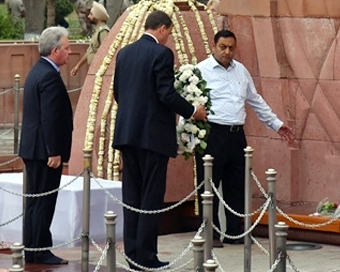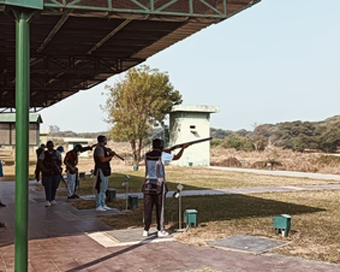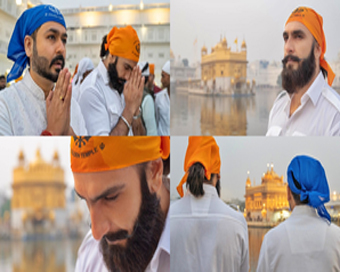 PM Modi visit USA
PM Modi visit USA Only the mirror in my washroom and phone gallery see the crazy me : Sara Khan
Only the mirror in my washroom and phone gallery see the crazy me : Sara Khan Karnataka rain fury: Photos of flooded streets, uprooted trees
Karnataka rain fury: Photos of flooded streets, uprooted trees Cannes 2022: Deepika Padukone stuns at the French Riviera in Sabyasachi outfit
Cannes 2022: Deepika Padukone stuns at the French Riviera in Sabyasachi outfit Ranbir Kapoor And Alia Bhatt's Wedding Pics - Sealed With A Kiss
Ranbir Kapoor And Alia Bhatt's Wedding Pics - Sealed With A Kiss Oscars 2022: Every Academy Award Winner
Oscars 2022: Every Academy Award Winner Shane Warne (1969-2022): Australian cricket legend's life in pictures
Shane Warne (1969-2022): Australian cricket legend's life in pictures Photos: What Russia's invasion of Ukraine looks like on the ground
Photos: What Russia's invasion of Ukraine looks like on the ground Lata Mangeshkar (1929-2022): A pictorial tribute to the 'Nightingale of India'
Lata Mangeshkar (1929-2022): A pictorial tribute to the 'Nightingale of India' PM Modi unveils 216-feet tall Statue of Equality in Hyderabad (PHOTOS)
PM Modi unveils 216-feet tall Statue of Equality in Hyderabad (PHOTOS)India Open Competition in Shotgun, organised by the National Rifle Association of India (N
- Hockey India names Amir Ali-led 20-man team for Junior Asia Cup
- Harmanpreet Singh named FIH Player of the Year, PR Sreejesh gets best goalkeeper award
- World Boxing medallist Gaurav Bidhuri to flag off 'Delhi Against Drugs' movement on Nov 17
- U23 World Wrestling Championship: Chirag Chikkara wins gold as India end campaign with nine medals
- FIFA president Infantino confirms at least 9 African teams for the 2026 World Cup
At Jallianwala, British envoy non-committal on apology Last Updated : 13 Apr 2019 02:08:05 PM IST 
At Jallianwala, British envoy non-committal on apology As the nation commemorates the 100th anniversary of the massacre of hundreds of innocent Indians by British forces at the Jallianwala Bagh, British High Commissioner Sir Dominic Asquith on Saturday expressed deep regret and sorrow but remained non-committal on any apology coming from the British government on the brutal killings.
"We deeply regret what happened," the British High Commissioner said in his remarks in the Visitor's Book at the Jallianwala Bagh National Memorial here.
Asquith paid floral tributes at the memorial.
On the issue of an apology by his government, Asquith evaded a direct response to the media: "I know this is a really important question. I would just ask you to respect what I came here to do which was to commemorate those who died here a 100 years ago -- to express the sorrow of the British government and the British people."
"What happened 100 years ago was a tragedy. Prime Minister Theresa May in the House of Parliament this week referred to it as a 'shameful scar' in our history.
"Her predecessor, Prime Minister David Cameroon, when he visited India, referred to it as a deeply shameful scar. My own great grand father, who was Prime Minister for almost a decade, in 1960 referred to this as one of the worst outrages in our whole history," he said, adding that both governments (Britain and India) are committed to the flourishing relationship (between both countries)," he said.
"Today we remember with deep sorrow those who were killed on April 13, 1919 and regret the suffering caused," Asquith also tweeted.
The day marks the centenary of the massacre, in which British forces led by Brigadier General Reginald Dyer opened fire on hundreds of unarmed, innocent Indians, including women and children, who were protesting peacefully against the oppressive Rowlatt Act of the British government.
The massacre, on April 13, 1919, is one of the darkest chapters of India's freedom struggle against the British occupation. The official death toll by the British government was put at 379 killed though there were claims that over 1,000 people were killed.
"The event of Jallianwala Bagh 100 years ago reflects a shameful act in British-Indian history. We deeply regret what happened and the suffering caused.
"I am pleased today that the UK and India have remained committed to developing together a thriving 21st-century partnership," Asquith wrote in the Visitor's Book at the memorial.
IANS New Delhi For Latest Updates Please-
Join us on
Follow us on








172.31.16.186







